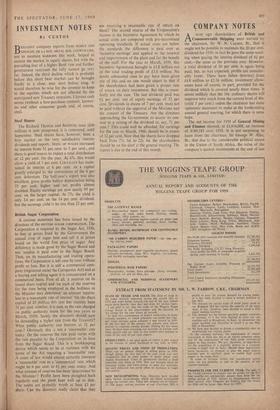INVESTMENT NOTES
By CUSTOS
BRILLIANT company reports from MARKS AND SPENCER, DE LA RUE, METAL BOX, COURTAULDS, not to mention HARRODS this week, helped to sustain the market in equity shares, but with the prevailing fear of a higher Bank rate and further government restraints the rally cannot go very far. Indeed, the third decline which is probable before this short bear market can be brought finally to a close, may start before long. It would therefore be wise for the investor to keep to the equities which are not affected by the anticipated new Treasury restraints. I favour cash stores (without a hire-purchase content), brewer- ies and other consumer goods and, of course, steel.
Steel Shares
The Richard Thomas and Baldwins issue (£40 million) is now postponed, it is rumoured, until September. Steel shares have, however, been a firm market on the very satisfactory interim dividends and reports. STEEL OF WALES increased its interim from 34 per cent. to 5 per cent., and there is good reason to expect a total distribution of 12 per cent. for the year. At 47s. this would allow a yield of 5 per cent. CoLviEEES has main- tained its interim at 6 per cent. on a capital greatly enlarged by the conversions of the 6 per cent. debenture. The • half-year's report was also excellent, gross profits before depreciation being 55 per cent. higher and net profits almost doubled. Equity earnings are now nearly 95 per cent. on the larger capital. At 77s. the yield is only 3.6 per cent. on the 14 per cent. dividend, but the earnings yield is no less than 25 per cent.
British Sugar Corporation
A curious statement has been issued by the directors of the BRITISH SUGAR CORPORATION. The Corporation is required by the Sugar Act, 1956, to buy at prices fixed by the Government the annual crop of sugar beet and sell it at prices based on the world free price of sugar. Any deficiency is made good by the Sugar Board and any surplus is paid over to the Sugar Board. Thus, on its manufacturing and trading opera- tions, the Corporation is left year by year without profit or loss. But it is still a commercial com- pany (registered under the Companies Act) and as a buying and selling agent it is remunerated on a commercial basis. First of all, it receives on its issued share capital and 'on such of the reserves for the time being employed in the bainess as the Minister may determine' an amount 'equiva- lent to a reasonable rate of interest.' On the share capital of £5 million this rate has recently been 31 per cent. (similar, it is said, to the rate charged on public authority loans for the two years to March, 1959). Surely the directors should now be demanding a *her rate from the Treasury? What public authority can borrow at 31 per cent.? Obviously this :s not a 'reasonable' rate today. On the reserves the rate paid varies with the rate payable by the Corporation on its loan from the Sugar Board This is a bookkeeping device which seems to be at variance with the terms of the Act requiring a 'reasonable' rate. A court of law would almost certainly interpret a 'reasonable' rate as a 'commercial' rate, which might be 6 per cent. to 61 per cent. today. And what amount of reserves has been 'determined by the Minister"? Profits have been ploughed back regularly and the plant kept well up to date. The assets are probably worth at least £3 per share. Can the directors really claim that they
are receiving a reasonable rate of return on them? The second source of the Corporation's income is the Incentive Agreement by which its actual costs are compared with pre-determined operating standards. If actual costs are below the standards the difference is paid over as 'incentive earnings' and applied to the renewal and improvement of the plant and for the benefit of the staff. For the year to March, 1959, this Incentive Agreement brought in £1.8 million out of the total trading profit of £3.4 million. No doubt substantial rises in pay have been given out of this and no one would object to that if the shareholders had been given a proper rate of return on their investment. But this is mani- festly not the case. The last dividend paid was 6+ per cent. out of equity earnings of 32 per cent. Dividends in excess of 7 per cent. must not be paid without the approval of the Minister and the consent of the Treasury. Are the directors approaching the Government to secure its con- sent to a raising of the dividend to, say, 71 per cent.? This could well be afforded, for earnings for the year to March, 1960, should be in excess of 32 per cent. Now that the shares have dropped back from 27s. 6d. to 22s. 6d. the shareholders should be on the alert at the general meeting. The report is due at the end of this month.










































 Previous page
Previous page